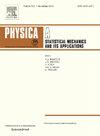Modeling non-equilibrium mixed traffic flow in composite road environments with “End-Edge-Cloud” structure
IF 3.1
3区 物理与天体物理
Q2 PHYSICS, MULTIDISCIPLINARY
Physica A: Statistical Mechanics and its Applications
Pub Date : 2024-11-26
DOI:10.1016/j.physa.2024.130263
引用次数: 0
Abstract
This paper establishes a mixed traffic flow car-following model that describes the operation of non-equilibrium mixed platoon in the composite road environment, to solve the problem of insufficient adaptability of the existing mixed traffic flow models due to the composite road environment consisting of straight and curved roads. First, the non-equilibrium distribution of vehicles in the longitudinal and lateral directions of the road is used to study the characteristics of non-equilibrium mixed traffic flow. An asymmetric stochastic car-following model is built to represent the stochastic factors and the acceleration and braking behaviors of vehicles in the actual highway environment, in conjunction with the electronic throttle dynamics. Secondly, based on the force analysis and the car-following characteristics of vehicles on a slope curve, a mixed traffic flow car-following model adapted to the road conditions of the curve is constructed. Finally, an overall model describing the operation of non-equilibrium mixed vehicles in composite road environments is established through the “End-Edge-Cloud” architecture. Numerical experiments also compare and evaluate the effects of different road characteristics and key factors on the stability of mixed traffic flow. Through comparative analysis, it can be found that on straight roads, the mixed platoon needs to resist external perturbations, and then accurately track the desired headway in order to improve the traffic efficiency. On curved roads, the mixed platoon needs to maintain a stable desired speed to ensure safe and efficient passage through the curved road section.
基于“端缘云”结构的复合道路环境非平衡混合交通流建模
本文建立了描述复合道路环境下非均衡混合排运行的混合交通流车辆跟随模型,解决了现有混合交通流模型由于复合道路环境由直路和弯路组成而适应性不足的问题。首先,利用车辆在道路纵向和横向的非平衡分布,研究非平衡混合交通流的特征。结合电子油门动力学,建立了一种非对称随机车辆跟随模型,以表示实际公路环境中车辆的随机因素和加速、制动行为。其次,在受力分析的基础上,结合斜坡曲线上车辆的跟车特性,构建了适应该曲线路况的混合交通流跟车模型;最后,通过“End-Edge-Cloud”架构建立了非平衡混合车辆在复合道路环境下运行的整体模型。数值实验还比较和评价了不同道路特性和关键因素对混合交通流稳定性的影响。通过对比分析可以发现,在直线道路上,混合排需要抵抗外部扰动,然后准确跟踪期望车头时距,以提高通行效率。在弯曲路段,混合车队需要保持稳定的期望速度,以保证安全高效地通过弯曲路段。
本文章由计算机程序翻译,如有差异,请以英文原文为准。
求助全文
约1分钟内获得全文
求助全文
来源期刊
CiteScore
7.20
自引率
9.10%
发文量
852
审稿时长
6.6 months
期刊介绍:
Physica A: Statistical Mechanics and its Applications
Recognized by the European Physical Society
Physica A publishes research in the field of statistical mechanics and its applications.
Statistical mechanics sets out to explain the behaviour of macroscopic systems by studying the statistical properties of their microscopic constituents.
Applications of the techniques of statistical mechanics are widespread, and include: applications to physical systems such as solids, liquids and gases; applications to chemical and biological systems (colloids, interfaces, complex fluids, polymers and biopolymers, cell physics); and other interdisciplinary applications to for instance biological, economical and sociological systems.

 求助内容:
求助内容: 应助结果提醒方式:
应助结果提醒方式:


